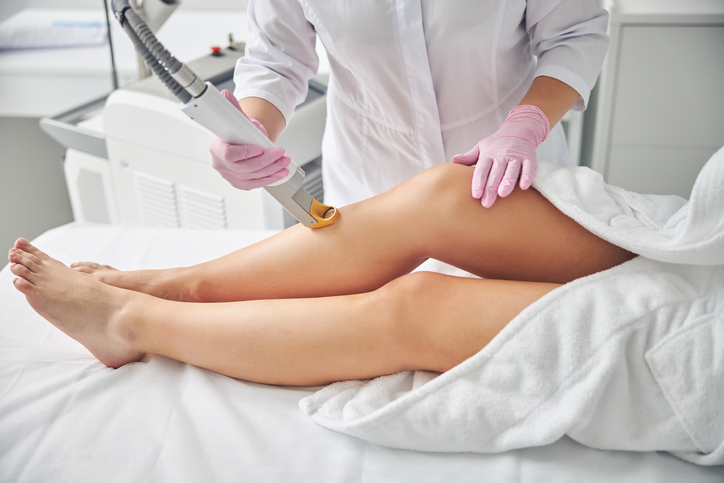
The evolution of intense pulsed light
Intense pulsed light (IPL) has become a staple in beauty salons and dermatology clinics. Learn how it works for hair removal, acne management, and more.
Dr Michael Rich is a specialist dermatologist who has been performing tumescent liposuction for over 30 years. Find out if Liposuction is suitable for you at ENRICH Clinic.
At ENRICH Clinic, we have a wide range of dermatological and cosmetic body treatments tailored to individual body and patient needs.
At ENRICH Clinic, our treatments are performed by our medical team consisting of doctors, nurses, and dermatologists and are tailored to each patient’s skin health needs.
ENRICH Clinic is committed to your skin health and well-being with a range of dermatological & cosmetic treatments tailored to the individual. Our treatments are performed by our medical team consisting of doctors, nurses, and dermatologists.
Skin health is essential for everyone. ENRICH Clinic has a wide range of technologies and dermatological solutions to help you achieve your skin care goals.
One of the best times to get a skin check is right before summer. Why? Because you’re still as pale as you’ll ever be, any spots will be more prominent, and you can get a base map for your skin so that in a year, you’ll have something with which to compare it.
Skin cancer is the abnormal growth of cells. There are different types and causes of skin cancer, but the main reason a skin cancer develops is UV exposure that damages the DNA in cells and results in abnormal growth.
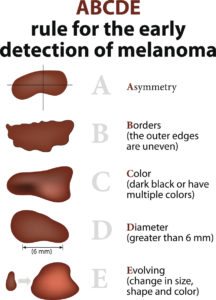
Skin cancer starts when abnormal, DNA-mutated skin cells proliferate unchecked. There is evidence that this process continually occurs throughout our entire body, but the immune system kicks in and arrests the growths.
When skin cancer is allowed to continue to develop – that is, the abnormal cells multiply until there are so many they make a lesion – it can be dangerous.
Skin cancer always begins in the skin’s outer layer, known as the epidermis. The thin epidermis is a layer of cells that continuously shed, making way for the new cells. The epidermis is made up of three different types of cells: squamous, basal and melanocytes.
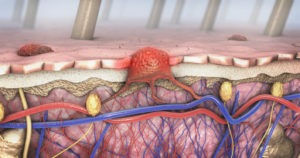
While it is true that dark skin tones can develop skin cancers, skin cancers tend to develop more on lighter skin. Melanin is your skin’s natural sunscreen and protects the underlying layers of skin from DNA damage caused by UV rays.
But, melanin is not magic and can’t prevent all skin cancers from developing. Melanomas, for example, are possibly deadly skin cancers that develop inside melanocytes – the very cells that produce melanin.
People with many moles are known to be more prone to skin cancers, with moles often occurring in those with pale skin. The more moles, the higher the risk of skin cancer developing. Moles themselves aren’t necessarily cancer-prone on their own, but observation tells us that many moles equal increased risk of skin cancer developing.
The Sun Protection Factor (SPF) of sunscreen is an important factor when choosing a sunscreen. You want a sunscreen that is the highest SPF you can find, which at this point is SPF50 or higher. Sunscreen on your face is essential not just to protect you from DNA damage that causes skin cancers, but from premature ageing caused by sun damage.
DNA damage caused by UV rays affects every aspect of skin cell function. Protect yourself from the sun.
There are a few key elements that contribute to skin cancer developing, and it’s good to know what these are so you can figure out your risk profile.
While anyone can get skin cancer anywhere on their body, the chances of some people developing skin cancer in certain areas is higher.
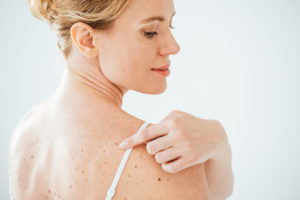
Having less protection – melanin – in your skin means the UV rays can penetrate and damage the DNA of skin cells. Naturally blonde or red-haired people are the most at risk. The darker your complexion, the more melanin you have, which equates to greater skin cell protection. But don’t let a darker skin tone lull you into a false sense of security: anyone can get skin cancer.
If you have had one or more severe sunburns, especially as a child or teenager, your risk of skin cancer is increased as an adult. Sunburn, as an adult, counts towards your risk profile.
If you love being out in the sun, you are at a greater risk of developing skin cancer. Even if you wear sunscreen, but don’t reapply it as often as you should or wear short sleeves or skirts/shorts where parts of your body are exposed without sunscreen relatively often, your risk increases.
Sun exposure is sun exposure. This exposure also includes tanning beds, which aren’t allowed anymore, but many of you spent hours in these beds when you were younger.
If you live in a high-altitude, sunny, hot climate, your lifetime exposure to UV rays increases versus colder, lower areas. Exposure to stronger UV rays means an increased risk of DNA damage and mutations. The closer to the sun you get, the stronger and more damaging the UV rays, which occur at higher altitudes.
Some UV rays, such as UVC rays, are short-wave, meaning they don’t always reach us, so getting higher up means catching more of these ultra-damaging rays.
If you’ve had it before, you are susceptible and may develop skin cancer again. A family member with skin cancer is also a sign to be vigilant with regular skin checks.
There are many other reasons you may develop skin cancer, so instead of reading about it on the internet, go and get a skin check at ENRICH Clinic. Dr Michael Rich has a long association with the Skin Health Institute (formerly the Skin and Cancer Foundation) and sees Institute patients for half a day per week.
Be skin safe this summer
Contact us for a consultation
ENRICH Clinic
*With all surgeries or procedures, there are risks. Consult your physician (GP) before undertaking any surgical or cosmetic procedure. Please read the consent forms carefully and be informed about every aspect of your treatment. Surgeries such as liposuction have a mandatory seven-day cooling-off period to give patients adequate time to be sure of their surgery choice. Results may also vary from person to person due to many factors, including the individual’s genetics, diet and exercise. Before and after photos are only relevant to the patient in the photo and do not necessarily reflect the results other patients may experience. Ask questions. Our team of dermatologists, doctors and nurses are here to help you with any of your queries. This page is not advice and is intended to be informational only. We endeavour to keep all our information up to date; however, this site is intended as a guide and not a definitive information portal or in any way constitutes medical advice.
"*" indicates required fields
Combining Dr Rich’s dermatological skill with his knowledge of restorative skin regimes and treatments, the ENRICH range is formulated to help maintain and complement your skin. Our signature Vitamin C Day & Night creams are now joined by a Vit A, B,&C Serum and a B5 Hyaluronic Gel, both with hydration properties and much, much more.

Intense pulsed light (IPL) has become a staple in beauty salons and dermatology clinics. Learn how it works for hair removal, acne management, and more.
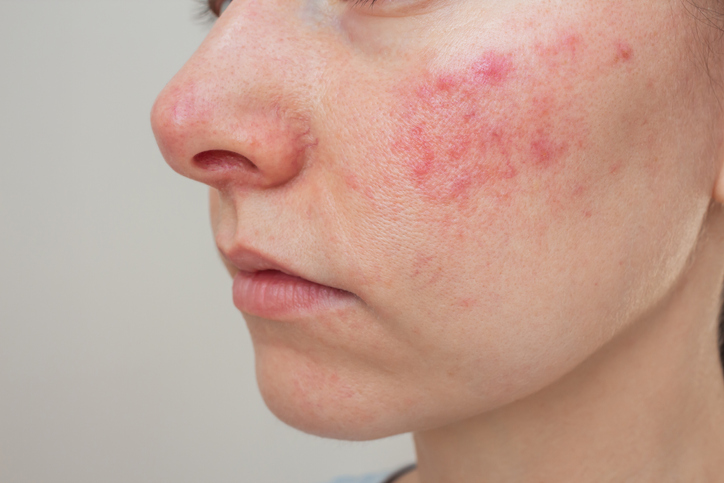
Worried you have eczema, dermatitis, or psoriasis? We talk symptoms, causes, triggers, and treatments for these common causes of itchy skin.

Research has shown that snoring can be reduced by up to 60% after two or three treatments with ENRICH Clinic’s high-tech target lasers designed to tighten the soft palate and stop snoring.
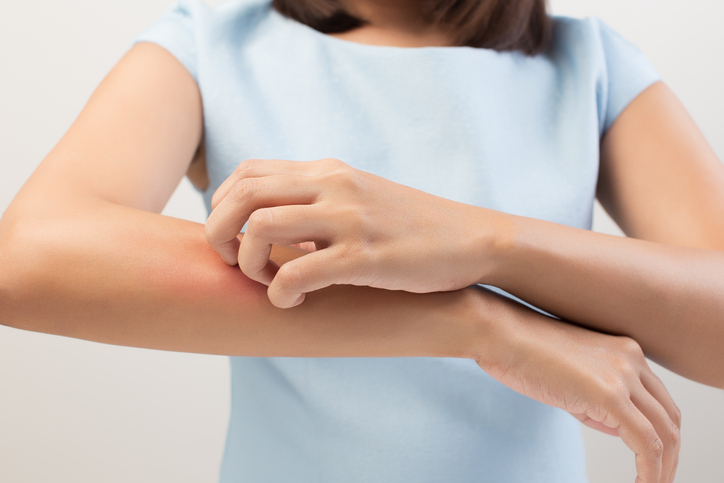
Suddenly dealing with itchy skin? We’ll talk about the common causes and how to find relief.
Subscribe to the ENRICH newsletter and receive latest news & updates from our team.
Enrich Clinic acknowledges the Traditional Lands of the Wurundjeri Woi Wurrung and Bunurong peoples of the East Kulin Nations on which we work and trade. We pay respect to their Elders past, present and emerging. We extend our acknowledgement and respect to the LGBTQIA+ community who we welcome and support. Read our full Acknowledgement Statement here
